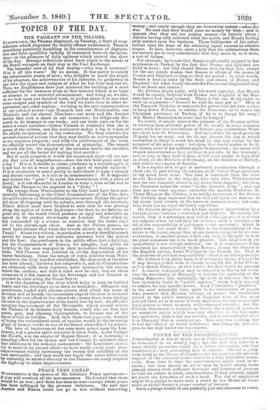PEACE VERY CHEAP.
:WONDERFUL is the success of Mr. Cobden's Peace movement— if you will overlook all the non-successes. He foretold that there would be no war ; and there has been no war—except where peace has been infringed by the grossest violations. He said that Austria and Russia could not go to war without borrowing
money ; and surely enough they are borrowing moneyenafterehe war. He said that they would raise no money by loan ; appears that they are not raising money—in certain pliees ; Austria having only collected what she needs, and Russia having only entered upon the business. These fulfilments of his calcu- lations raise the hope of his attaining equal success in ulterior stages. It does, however, seem a pity that the subtractions from his success are so very considerable that they make it, as it were, a sort of failure.
For example, he boasts that Russia is effectually stopped in her aggression on Turkey by the fact that France and England are hand in hand: but why should Russia stop for that fact, except for the one simple reason that Russia is afraid of the power of France and England so long as they are united ; in other words, Russia is kept in order by the fleets and armies of France and England : but what would she care for France and England if they had no fleets and armies ?
Mr. Cobden might reply, with his usual sagacity, that Russia would be equally helpless with France and England if the Rus- sian forces had been reduced. There is but one fit rejoinder to such an argument—" Doesn't he wish he may get it?" How is the Emperor Nicholas to maintain his power over his own nobles, to keep down Poland, to subdue the Caucasus, or to annex the Christian provinces of Turkey, if he is to forego his army ? Ask Master Bernardin to come and be hanged! No doubt, it might answer the purpose of the Russian nobles to overturn that arbitrary power of the sword, to make common cause with the free institutions of Europe, and to introduce West- ern ideas into St. Petersburg. But meanwhile his most gracious Majesty has an army, and we do not discern the day in which conviction is likely to reach his mind in any way except by the conquest of his great army : but then, that needs armies to do it. Of course, some of his soldiers might be converted ; but many will remain unconverted so long as there is a rouble in the treasury ; and so long as they hold to him, it will need armies to keep him in check on the frontiers of Germany, on the frontiers of Turkey, and within the empire of Austria.
It is a capital idea to get at universal pacification through a short cut, by just telling the nations, as M. Victor Hugo proposes, to lay down their arms. The idea is borrowed from the cele- brated Beefeater in the tragedy, who tells Don Whiskerandos and the two vengeful nieces to lay down their daggers: but then, the Beefeater issues his order "in the Queen's name "; and one does not see what supreme authority the modern Beefeater, M. Victor Hugo or Mr. Cobden, is to invoke in support of his decree. Mr. Cobden may represent that he will call upon the nations to lay down their swords in the name of common sense ; but com- mon sense has no royal authority anywhere.
Mr. Cobden altogether sets his face against intervention by a foreign power between a sovereign and subjects. He naively ob- serves, that if a sovereign may call in a foreign power to reduce his subjects when he and they are at issue, such a doctrine gets rid of the responsibility of governors to the governed : which is quite true ; but what then ? What is the responsibility of the rulers to the ruled, except that of one power, energetic by its con- centration, to another power which can only be brought to bear on great occasions but is in itself greater. This final test of re- sponsibility is not always enforced ; but it is sometimes—Juhn confessed his responsibility to the Barons, James the Second to the English nation, Louis Philippe to the French, &c. That is the doctrine of political responsibility : there is no other principle.
Mr. Cobden very justly says, how extremely wrong it would be if any foreign power were to dictate terms for Mr. John O'Con- nell to Queen Victoria, or vice versa: but how would he prevent it? A similar indignation may be extended to Russia for viola- ting the nationality of Hungary to enforce the authority of the young Emperor; but, unluckily, the facts in this case show us how extremely feeble is "public opinion," when bodily opposed to armies, for any specific action. Lord Palmerston "protested" in the most admirable tone, quite to the satisfaction of people who resented that Russian outrage on peace; the resolutions passed at the public meetings in England were of the most pointed kind, so as to make it seem impossible for any respectable royal person to brave so much well-expressed censure ; and Mr. Cobden threatened to crumple up Russia like a piece of paper,— an energetic policy which was very effective en the hustings; but, somehow, Russia did not abstain, and is not crumpled up— it is Hungary that is crumpled up. This case was a strong one to test the efficacy of moral influence; and Hungary, you see, goes to the dogs under the experiment.


























 Previous page
Previous page